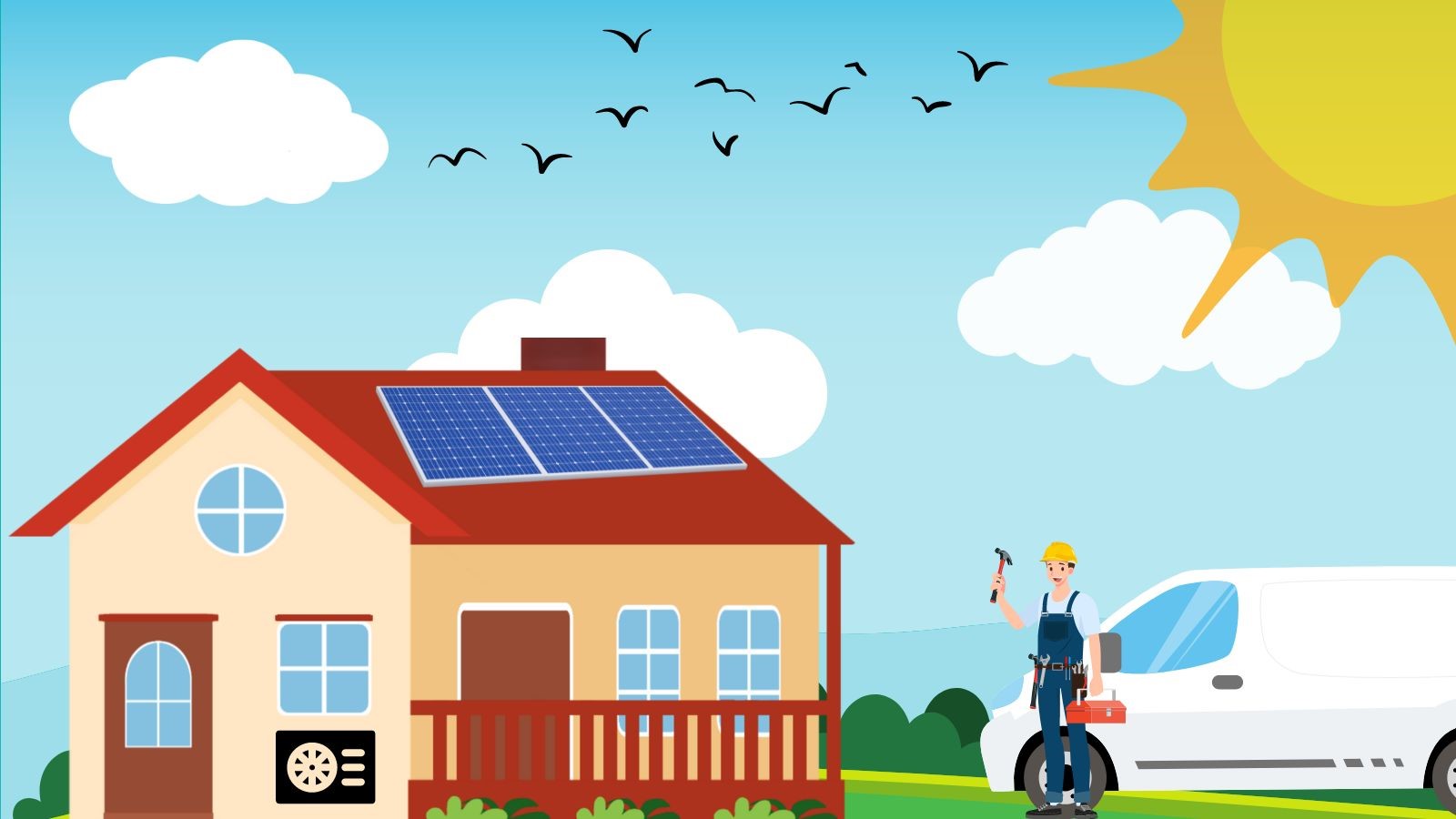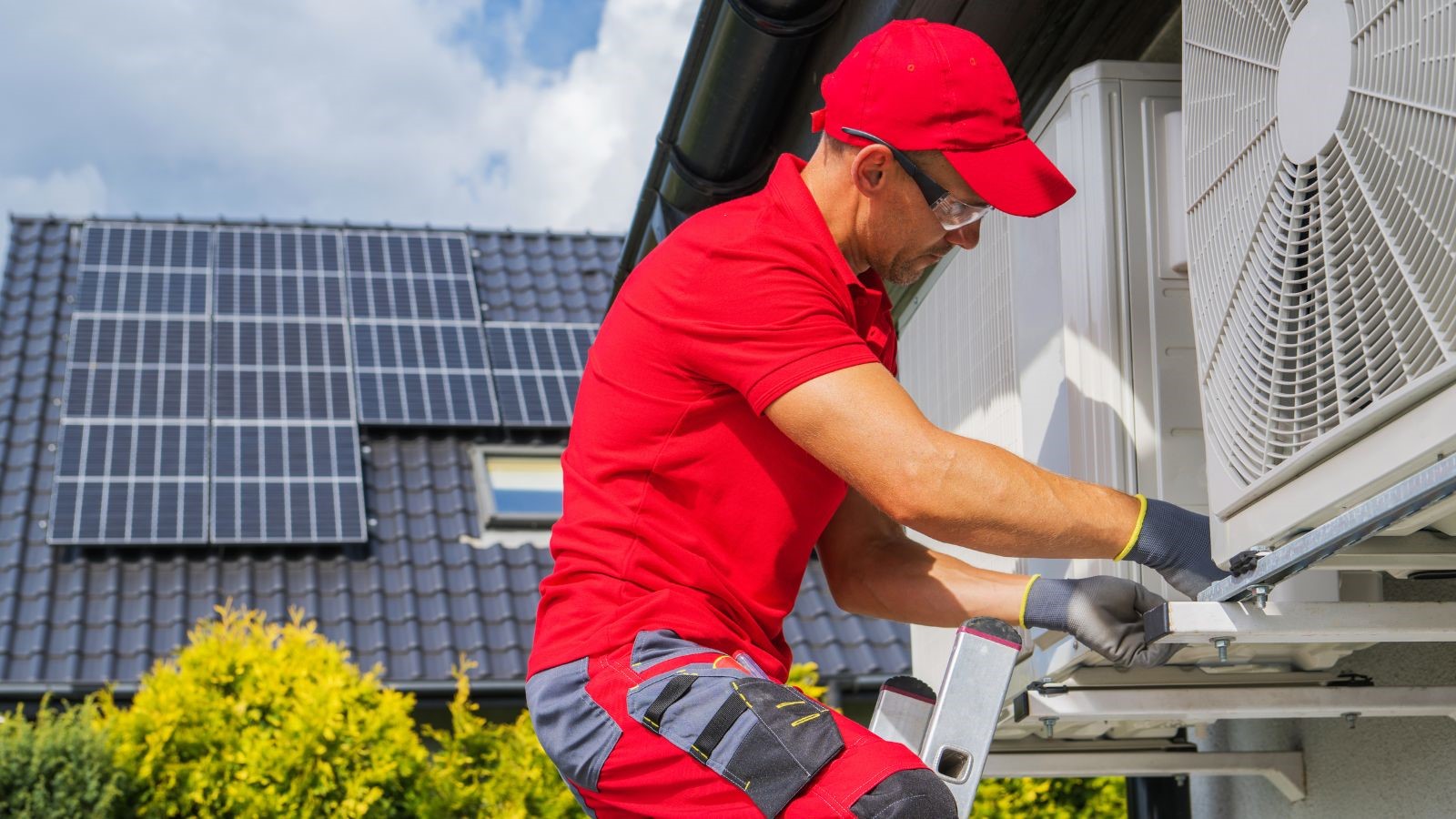
Demystifying heat pumps – understanding green tech
Read time: 3 minutes
We hosted a Demystifying Heat Pumps webinar where we discussed the technology with a panel of experts, touching on how they work, the returns on investment, policy restrictions, and savings. Here’s what we learned on the day.
The government has set an ambitious target to reduce business energy use by 20 per cent by 2030. Presently, domestic heating accounts for roughly 14 per cent of UK emissions, highlighting a huge opportunity for decarbonisation within this sector, while all heating accounts for about 37 per cent of UK carbon emissions.
The government is doing things to support, incentivise, and encourage decarbonisation of heat, such as requiring the energy performance certificate of a building to be publicly displayed, but the challenge of decarbonising UK heat carries an estimated cost of £200bn.
The UK government is behind on its target to install 600,000 heat pumps a year by 2028 (currently it only achieves around 100,000 installations annually), which could see the UK pay an extra £9bn for gas imports.


They provide an alternative for decarbonisng heat as opposed to burning fossil fuels.
“This technology has been around since 1853. The refrigeration cycle hasn’t changed dramatically since it came out,” explains Andy Louth, managing director at Groundtherm. The technology used to operate a heat pump is similar to that found in a refrigerator or air conditioner. “What we do is take electricity and magnify that through an air source heat pump, pull this over an evaporator, put it through the refrigeration cycle, and on the other side of it we have hot gas. The processes are for either heating or chilling.”
In the winter, a heat pump extracts heat from outside a building and moves it inside. In the summer, it provides cooling by shifting heat from the inside to outside.
“One of the main selling points for a heat pump is that they can produce heating and cooling very efficiently which reduces energy usage and costs. As businesses and investors focus more on ESG factors, heat pumps can help with green reputation and lowering energy costs,” says Charlotte Lee, chief executive at the Heat Pump Association.
“We know that investors focus on ESG more and more now, so having an efficient heating system sends the right signals,” Charlotte adds.
“I would always suggest you do your own survey first. That way, if you do bring somebody to the table, they’ll have a clear outset of what you’re looking at and an understanding of your requirements,” says Andy.
“Heat pumps generally work better in more efficient buildings. It’s not necessarily the age or the size of the building that matters, but its energy efficiency,” explains Charlotte.
In summary, here are the key considerations when seeking heat pump technology


Our webinar featured a live Q&A, giving the audience an opportunity to ask the panel their heat pump questions. Here’s what you wanted to know.
AL: Make sure you’ve got a good enough area. There can be restrictions with an air source heat pump in terms of where outside the building you can locate that air source.
One consistent restriction is the logistics of getting the pipework into the building to ensure the heat pump is working effectively. Any alterations you may need to make in this building to ensure you are maximising the efficiency of your heat pump need to be acknowledged. That’s down to the consultant and the installer to set realistic expectations for the client.
CL: Ensure the building owner is on board. Sometimes, if the building is under lease the decision making in terms of heating and hot water systems may not lie with the business. So ensure alignment as early as possible between the business and the building owner.
AL: You’re going to want to know what your consultant is going to consult on and what advice they’ll give you at the end. Consultants need to be multi-faceted and have an understanding of multiple sides of the project, requirements, and outcomes.
Your installer should focus on what will be installed, its function, commissioning and maintaining the system. To pick your installer, ensure they have delivered a project of your type before. A lot of installers are busy with domestic properties, so ensure you have a good consultant who can oversee commercial projects and find a suitable commercial installer.
You can use the Green Economy marketplace to search for local, accredited heat pump installers ready to partner with you.
AL: Hybrid heat pumps with a boiler - there are situations where the heat pump might not be able to do the boiler’s function. But some of the new heat pumps on the market are more than capable, and the technology is advancing rapidly.
What you can do is have a ground source and air source hybrid system. On warmer days, a dry air cooler is more efficient than your ground source, so you can use that side of the system to produce your hot water demand or production demand for heating. Then, in the winter, it would use proportionally more of the ground source side than it would the air source.
CL: In terms of domestic fitting, there are more financial support options out there. The Boiler Upgrade Scheme provides grants of £5,000 for ground source and £6,000 for air source installations. These are accessible for non-domestic properties too up to 45kWt, so the size-band restricts access to this scheme.
For a domestic setting, there is an upfront capital contribution from government that can be claimed. The price of electricity will also impact the economics of a heat pump system; there is work the industry needs to do in terms of offering impartial advice to consumers on usage of heat pumps. To get the best out of a heat pump, there are a few tricks that consumers need to know.
For domestic rollout, newbuild housing and the future homes standard is hopefully coming which should drive heat pump installations.
This one hour discussion brings together installers, business advisors and technology experts to discuss all you need to know about procuring, installing and maximising value from a heat pump.
During this webinar our panel of experts looked at the potential that this technology can afford a business looking to minimize energy costs and reduce reliance on gas supplies. The panel offer insights into the installation process, including time frames and how this might impact the day-to-day running of your business, as well as the potential return on investment and the financial routes that you can consider when purchasing.
Chaired by Katherine Burden, Senior Business Development Manager at Green Economy, the session included expertise from:
Charlotte Lee, Chief Executive, Heat Pump Association
Andy Louth, Managing Director, Groundtherm
Watch the full webinar here.
Do you install green technology or provide net zero services?
Green Economy's partners have new sales opportunities for installers of solar, LED lighting, heat pumps, EV charging and battery storage, and for providers of energy management systems.
Green technologies and services businesses can create a free profile on the Marketplace to receive direct enquiries from new customers, as well as exclusive sales opportunities from Green Economy.
Explore servicesSearch for a local, trusted green tech supplier
Search for local suppliers by technology, location and experience on the Green Economy Marketplace.
Need more help? We can help you navigate the journey to net zero with expert support and guidance.
Explore MarketplaceGreen Economy events and training
Explore our programme of webinars, networking opportunities and a series of masterclasses designed to help businesses to demystify green technologies, to decarbonise and grow.
Green Economy members also receive exclusive invitations to join business development events and exhibitions, and live meet the buyer sessions.
Find out more